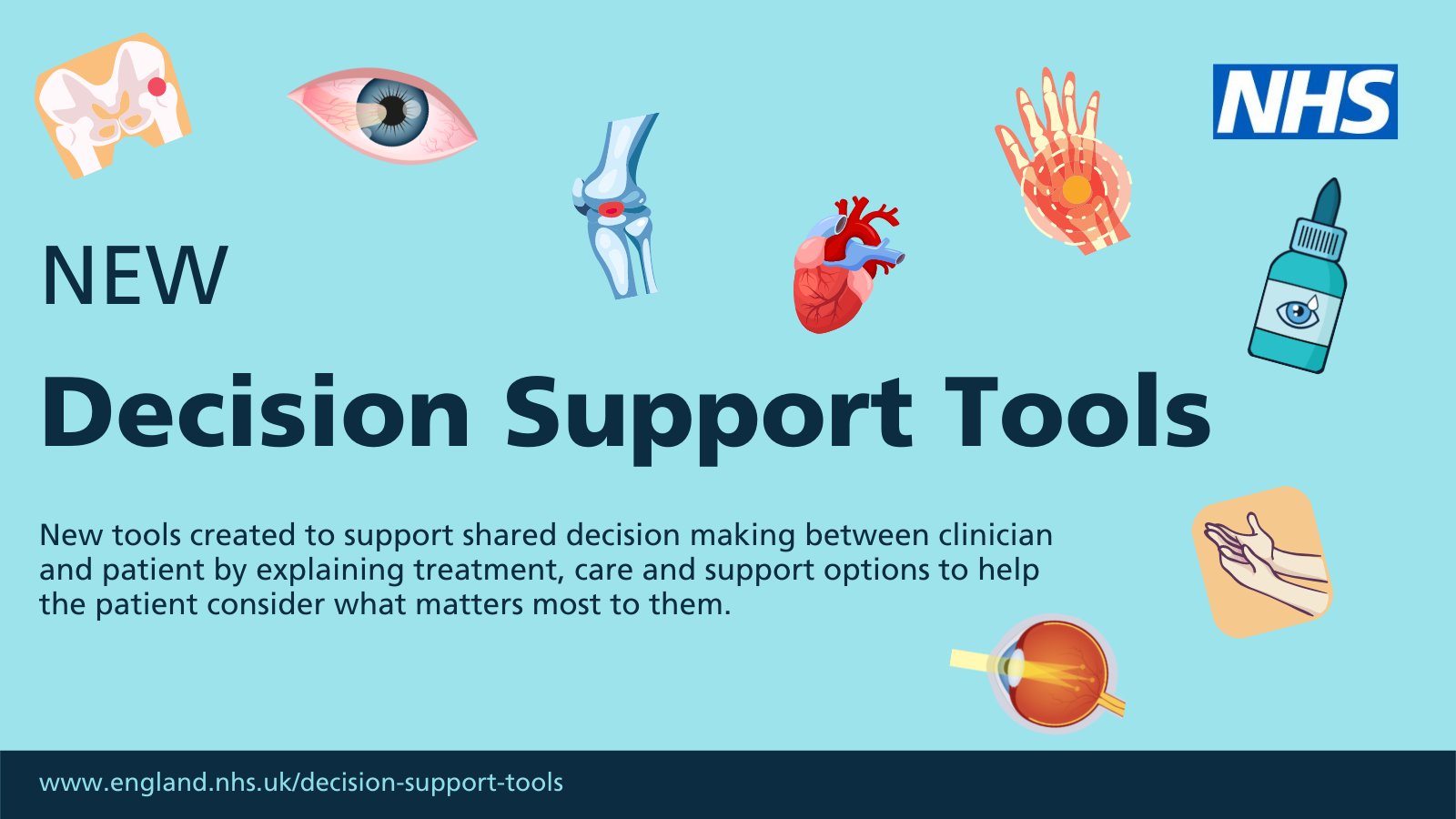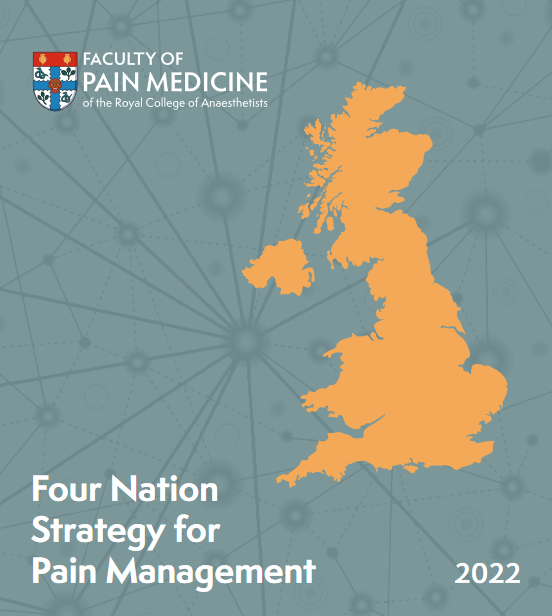 It’s been exciting in the last two years to be working with the BestMSK Health team at NHS England, and now also with MSK improvement work in Wales. There’s been lots of talk about co-production, self-management support, reducing inequalities and a focus on prevention. The direction is very much one that ARMA can support. Then I read A Community Powered NHS from New Local and I started to wonder if we are being brave enough, going far enough, thinking big enough.…
It’s been exciting in the last two years to be working with the BestMSK Health team at NHS England, and now also with MSK improvement work in Wales. There’s been lots of talk about co-production, self-management support, reducing inequalities and a focus on prevention. The direction is very much one that ARMA can support. Then I read A Community Powered NHS from New Local and I started to wonder if we are being brave enough, going far enough, thinking big enough.…
Read more of this article
Category: Health Policy
Decision support tools published
 NHS England has published a suite of eight decision support tools covering varying conditions along with guidance on how to use them and evaluating the impact.
NHS England has published a suite of eight decision support tools covering varying conditions along with guidance on how to use them and evaluating the impact.
Four of these relate to MSK conditions:
- Making a decision about Dupuytren’s contracture
- Making a decision about carpal tunnel syndrome
- Making a decision about hip osteoarthritis
- Making a decision about knee osteoarthritis
Decision support tools (DSTs), also called patient decision aids, support shared decision making (SDM) by making treatment, care and support options explicit, providing evidence-based information about the associated benefits and risks, and helping people to consider what matters most to them in relation to the possible outcomes, including doing nothing.…
Read more of this article
Four Nation Strategy for Pain Management
 The Faculty of Pain Medicine is pleased to announce the publication of a Four Nation Strategy for Pain Management.
The Faculty of Pain Medicine is pleased to announce the publication of a Four Nation Strategy for Pain Management.
This framework, published 30 June 2022, integrates pain management across other stakeholder sectors of health and social care, and aims to help coordinate, deliver and further develop care using resources and pathways already available. It was developed in response to the changes occurring in health care across all four nations and increasing awareness of the importance of pain management.
A range of patient and professional organisations were involved in the development of this strategy document, including ARMA, Academy of Medical Royal Colleges, British Pain Society, British Psychological Society, Burning Nights, Chronic Pain Policy Coalition, Pain Concern, The Patient Voice of the British Pain Society, Physiotherapy Pain Association, Pain Nurse Network, Pelvic Pain Support Network, Royal College of Anaesthetists, and Royal Pharmaceutical Society.…
Read more of this article
Constellations, not stars
 by Sue Brown, CEO ARMA
by Sue Brown, CEO ARMA
Last week I attended a National Voices conference about ICS and the voluntary sector. One thing that really struck a chord with me was a speaker outlining his principles for collaborative success *:
- Mission before organisation
- Trust, not control
- Promote others not yourself
- Build constellations not stars
By the time you read this, the new statutory integrated care systems will have some into existence. If they follow these principles, they could contribute a lot to improve health services.…
Read more of this article
BestMSK Health latest
R ecent BestMSK Health activity includes London Region MSK Strategy and an upcoming webinar from the spinal workstream.
ecent BestMSK Health activity includes London Region MSK Strategy and an upcoming webinar from the spinal workstream.
The spinal webinar covers spine pathways, MDTs, Emergency pathways, and Axial Spondyloarthritis.
7 July 2022, 4.30 – 6.00pm
Those working in London may like to take a look at the London Musculoskeletal Health Strategy.
Embedding personalised care within MSK-integrated services
 by Dr Chloe Stewart, health psychologist and national clinical advisor in personalised care, NHS England
by Dr Chloe Stewart, health psychologist and national clinical advisor in personalised care, NHS England
It’s strange how certain moments in life stay with you, etched in your memory while others disappear forever. Sometimes the things we remember are not the big things but small and seemingly insignificant moments. I remember a distinct moment during my health psychology training, some twenty years ago now, when I realised just how much more needs to be done to ensure a shift in power between healthcare professionals and patients.…
Read more of this article
Making support for people in pain a reality
 Media coverage of MSK conditions and pain is rare. Good coverage even more uncommon. So it was great to see the BBC focus on chronic pain on 11 May. A week earlier, coverage of the NICE draft guidelines on managing arthritis generated headlines such as “Exercise instead of taking painkillers, arthritis sufferers told.” Unsurprisingly this resulted in outcry from those who rely on pain medication to manage their arthritis, especially those who really need surgery but are on unacceptably long waiting lists after the pandemic.…
Media coverage of MSK conditions and pain is rare. Good coverage even more uncommon. So it was great to see the BBC focus on chronic pain on 11 May. A week earlier, coverage of the NICE draft guidelines on managing arthritis generated headlines such as “Exercise instead of taking painkillers, arthritis sufferers told.” Unsurprisingly this resulted in outcry from those who rely on pain medication to manage their arthritis, especially those who really need surgery but are on unacceptably long waiting lists after the pandemic.…
Read more of this article
Primary and community MSK metrics
 The
The BestMSK Health programme has collaboratively codeveloped, with stakeholders and lived experience partners, draft high-level metrics to support the measurement of primary and community MSK service delivery.
BestMSK Health programme has collaboratively codeveloped, with stakeholders and lived experience partners, draft high-level metrics to support the measurement of primary and community MSK service delivery.
MSK professionals, analysts, leads/managers, commissioners or anyone working in the improvement of MSK services are encouraged to provide their feedback on these recommendations through a quick online survey, which is now open.
Feedback is welcomed from MSK professionals, analysts, MSK leads and managers, commissioners, MSK lived experience partners and anyone who is involved in system-wide transformation and improvement of MSK services.…
Read more of this article
BestMSK Health update
 New resources for the BestMSK Health programme have been added to the NHS Futures site, including the Primary and Community Care toolkit and a revised high impact strategy including new recommendations on paediatrics and self-management. All the resources are aimed at anyone at any level involved in improving MSK services. The High Impact Strategy contains a lot of recommendations, but most people only need to read the core recommendations and those for their specific area of work.
New resources for the BestMSK Health programme have been added to the NHS Futures site, including the Primary and Community Care toolkit and a revised high impact strategy including new recommendations on paediatrics and self-management. All the resources are aimed at anyone at any level involved in improving MSK services. The High Impact Strategy contains a lot of recommendations, but most people only need to read the core recommendations and those for their specific area of work.
 The launch webinar should be available on the site soon.…
The launch webinar should be available on the site soon.…
Read more of this article
Equity, Diversity and Belonging (EDB) Awareness Tool
 PhysioFirst and the CSP LGBTQIA+ network have
PhysioFirst and the CSP LGBTQIA+ network have  collaboratively run a project with stakeholders to promote EDB within the recognised Professional Networks (PN) of the CSP. The outcome of this project, which was structured as a series of three facilitated meetings attended by each participating Professional Network, is the first version of an EDB reflective awareness tool.
collaboratively run a project with stakeholders to promote EDB within the recognised Professional Networks (PN) of the CSP. The outcome of this project, which was structured as a series of three facilitated meetings attended by each participating Professional Network, is the first version of an EDB reflective awareness tool.
The aim of this awareness tool is to prompt, guide and support the Leadership Teams of all PNs to open the conversation and to reflect on equity, diversity and belonging within their own network and how they align with the CSP’s EDB Strategy.…
Read more of this article



